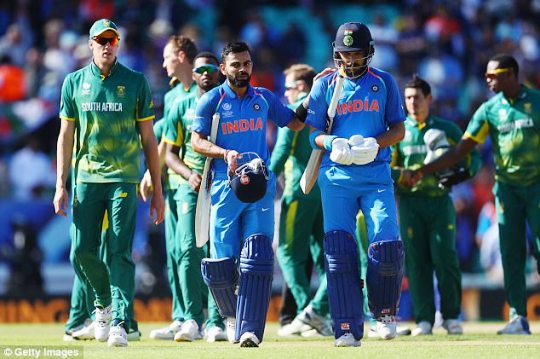London, Jul 12: Defending champions India outclassed South Africa in all departments of the game to enter the semi-finals of the ICC Champions Trophy with a comprehensive eight-wicket victory on sunday.

India will meet Bangladesh in the semi-finals in Birmingham on Thursday.
The Proteas lived up to their 'Perennial Chokers' tag in a virtual quarter-final clash that turned out to be a thoroughly one-sided encounter.
Shikhar Dhawan (78 off 83 balls) and skipper Virat Kohli (76 off 101 balls) made it look like a walk in the park as India chased down a target of 192 in only 38 overs.
It was Dhawan's third 50-plus score in the competition, while skipper Kohli made amends for a rare failure against Sri Lanka in style, notching up his 41st ODI half-century.
On a day when it mattered the most, India brought their A-game to the fore while AB de Villiers' men wilted under pressure, as it has been with them in high-stakes games.
The Indian bowling was disciplined, the fielding exceptional with three run-outs, and then there was a professional batting performance.
If it's the Champions Trophy, Dhawan can hardly put a foot wrong as he hit 12 fours and a flicked six off Morne Morkel over deep square leg.
If Dhawan muscled the ball through the off-side cordon, Kohli caressed it with care, hitting seven fours and a six as the duo added 128 runs for the second wicket.
A rhythm player to the core, Dhawan has made the best use of the second lease of life that he has got in this Champions Trophy. The ferocity with which he drove was a treat to watch. A lot of his shots were in the arc between cover and mid-off. When Imran Tahir bowled short, he pulled him with disdain.
Skipper Kohli also made merry with no pressure. He saw off Morkel's first spell before teeing off with a cover-driven six off rookie pacer Andile Phehlykwayo.
He later used the extra pace of Morkel to hit him down the ground, whip him through mid-wicket and slash the pacer over the off-side cordon.
By the time India's total touched 100, the match was as good as over. It was Yuvraj Singh, who finished the match with a pulled six off JP Duminy.
Earlier, an impressive bowling performance that was complemented by fantastic fielding effort, saw the holders skittle out South Africa for a paltry 191 in 44.3 overs after winning the toss.
It was yet another embarrassing batting collapse after the openers put on 76 runs. The world's number one team lost the last eight wickets for 51 runs after being comfortably placed at 116 for one at one stage.
Two run-outs of skipper AB de Villiers (16) and David Miller (1) within the space of six deliveries triggered the slide from which they could never recover, with almost all the Indian bowlers succeeding in choking the runs.
India bowled an astounding 141 dot balls which are equivalent to 23.3 maiden overs out of the 44.2 overs that South Africa batted.
India took control of the match in the second powerplay (between overs 11-40), in which South Africa managed only 143 runs, losing six wickets in the process.
After a poor match against Sri Lanka, Ravindra Jadeja (1/39 in 10 overs) was at his accurate best, stifling the runs in those middle overs in tandem with comeback man Ravichandran Ashwin (1/43 in 9 overs).
Man of the Match Jasprit Bumrah (2/28 in 8 overs) was on target with his blockhole deliveries and cleverly mixed short balls, which did the trick.
Bhuvneshwar Kumar (2/22 in 7.3 overs) was on a hat-trick as he not only polished off the tail but also maintained a brilliant channel outside the off-stump, making life difficult for the top-order batsmen.
Even Hardik Pandya (1/52 in 10 overs) gave a much better account of himself, bowling as many as 29 dot balls and also got Faf du Plessis (36) to drag one back onto his stumps.
Ashwin and Jadeja may not have got too many wickets but removed openers Hashim Amla (35) and Quinton de Kock (53, 72 balls) after a sedate start.
It was a safe start by South Africa with both Amla and India's nemesis in recent times, De Kock, not taking any undue risks in the first 10 overs (first powerplay) that yielded only 35 runs.
They were restrictive but both Bhuvneshwar and Bumrah couldn't produce too many wicket-taking deliveries during that phase.
The next seven overs saw South Africa score another 36 runs with Amla's return catch being dropped by Pandya, who erred in length. Amla flicked him over square leg boundary for a six.
Finally, it was Ashwin who got the much-needed breakthrough when Amla tried to cut a delivery that didn't have much width, only for Mahendra Singh Dhoni to complete a smart catch.
Du Plessis and De Kock also had a steady partnership of 40 runs for the second wicket before things went all awry. De Kock tried to sweep a straight ball onto the stumps to be plumb in-front.
De Villiers, who has been in horrible form, couldn't make his ground as Dhoni whipped off the bails in a flash.
The In-form Miller was involved in a horrible mix-up with Du Plessis to end up at the same end.
South Africa slumped to 142 for four from 140 for two in a space of six deliveries. India never took their foot off the pedal after the two run-outs.





Comments
Add new comment